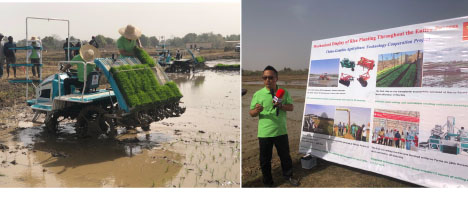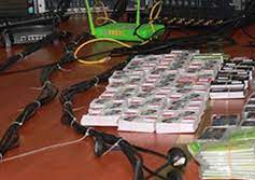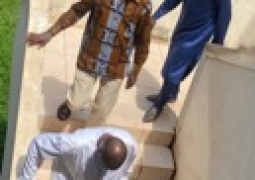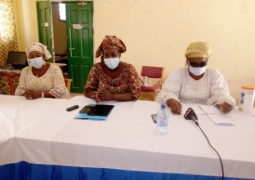
The Sapu rice field is a 5-hectare land secured for rice production. The possible harvest period of the rice from Sunday’s demonstration of the mechanised rice production is expected to be about 120 days.
The demonstration was geared towards the promotion of high-yield cultivation technology of hybrid rice variety, (GMB LS2021.)
Speaking at the occasion, Jacky Huang, Country Managing Director of Yuan Longping High-Tech Agriculture Co. Ltd. (L.P.H.T), said that the first phase of China-Gambia agriculture project started in 2019, with the second phase ongoing.
He revealed that the main aim of the project is to find solutions to boost the production of rice to achieve the purpose of zero hunger in The Gambia. According to him, the project is working on three areas such as production of rice, vegetable and maize.
He revealed that they are also doing a similar demonstration in Kerewan in the areas of maize and millet production during the rainy season. He added that the project is also building a training center in the West Coast Region (Jambanjelly mix farm) with 6000 square meters green house and the training center could train 80 personnel at once.
John Mendy, the agric regional director for Central River Region, south, said that agriculture cannot go without mechanization. “Now we live in a digital and mechanised world,” he said, adding that to attain food security, mechanisation needs to be implemented starting from land development to post-harvest periods.
He commended the China Aid project for helping in that direction in ensuring enough rice production in the country.
He stated that it is government’s priority to ensure that by 2030, the nation does not import rice from any country. “Because we have the fresh water; human resources and the land, so I see no reason to import rice if we have the right strategies in place,” he said, adding their Chinese counterparts are here to help.
Dr. Demba Jallow, the director of National Agriculture Research Institution (NARI), applauded the China-Aid team in The Gambia, saying that they are doing the right thing which it is in line with the country’s development objectives.
“It is in line with the government blueprint – the great recovery focused 2023-2027 and in line with the Ministry of Agriculture’s Strategy in improving agricultural productivity,” he declared.
He said that the project is a clear demonstration of their commitment towards food self-sufficiency. According to him, the China-aid project team has exposed them to 5 revolutionaries in the agriculture industry such as: the green revolution, white revolution, quality revolution, knowledge revolution and the value-added revolution. “This is what we need as a country,” he said.
Read Other Articles In Headlines





